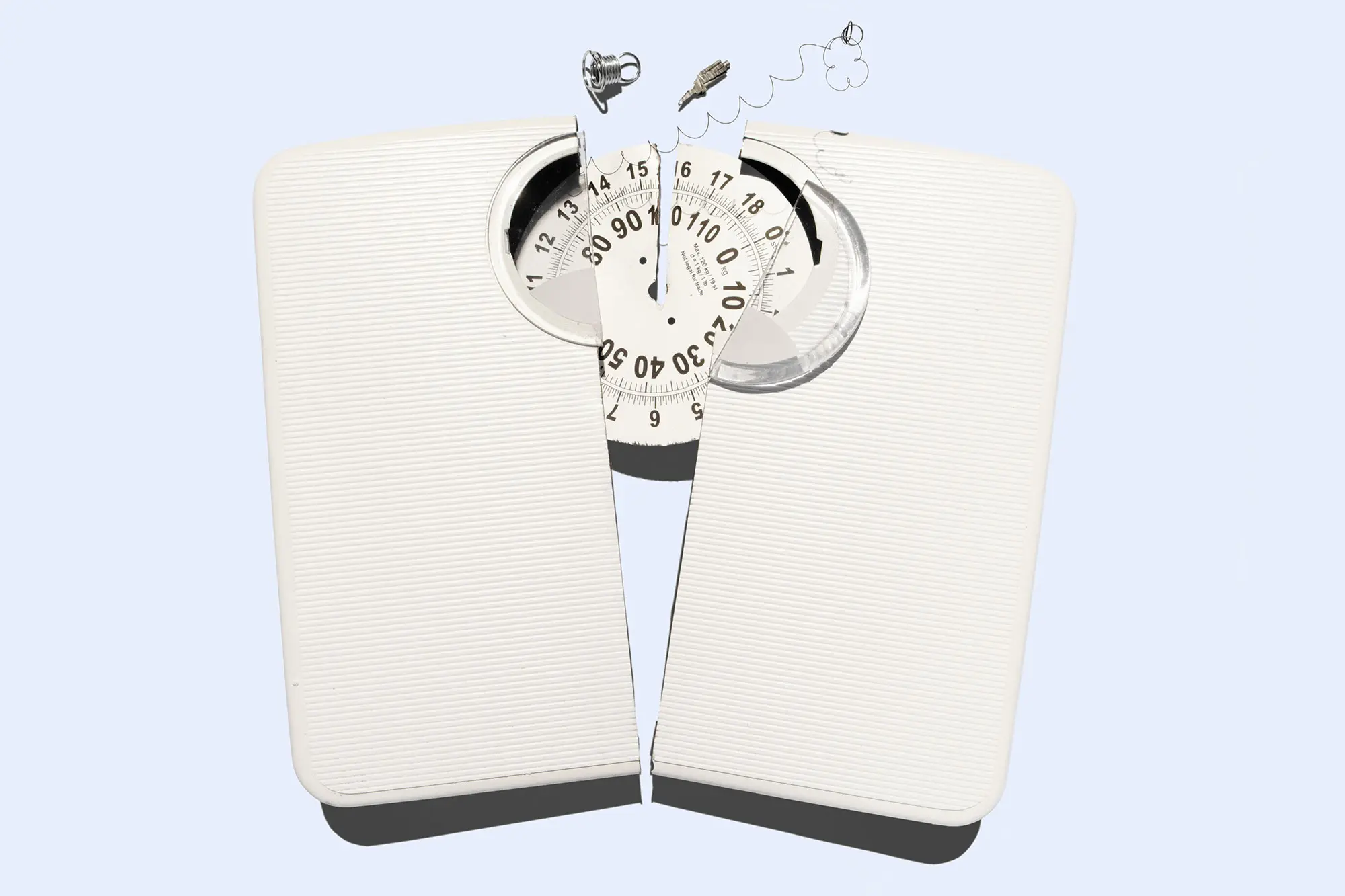Why Do Women Gain Weight During Menopause?
6 minute read

Summary
Menopausal weight gain commonly affects women during perimenopause and menopause due to hormonal changes, including declining estrogen and progesterone, which contribute to insulin resistance, decreased muscle mass, and increased abdominal fat. Additional factors such as sleep deprivation and hot flashes can further disrupt metabolism, raising the risk of type 2 diabetes and cardiovascular disease. Effective strategies to counteract weight gain include adopting a low-carbohydrate, high-protein diet, increasing physical activity with both cardio and strength training, and considering menopause hormone therapy under medical guidance.
One weird thing about perimenopause is the weight gain that comes along with it. Between the onset of perimenopause and your last period, an average of 5 to 8 pounds might creep onto your body gradually and unexpectedly as we enter the menopause transition.
Leading us all to ask: Why do women gain weight during menopause? In this article, we’ll do a deep dive into all the reasons.
Alloy educates women about menopause, including the causes of menopausal weight gain and how to counteract it. We also offer menopause hormone therapy solutions to supplement the body’s natural estrogen as it declines.
Take our online assessment to find the right solution for you.
Physical Changes that Contribute to Menopausal Weight Gain
Like reverse puberty, menopause weight gain occurs because our bodies slowly ease up on the production of estrogen and progesterone, which play a part in regulating our appetite and our energy levels.
According to the Mayo Clinic, this shift in our hormone levels brings on a host of other physical changes that prompts menopausal weight gain, like:
Insulin resistance
During perimenopause, your muscle, liver, and fat cells slow insulin processing, sending your pancreas into overdrive so sufficient glucose gets to your cells, according to the National Institute of Diabetes and Digestive and Kidney Diseases. Ironically, this makes us feel hungrier and more likely to store the carbs we eat as fat.
Decreased muscle mass
When you get older, your muscle mass decreases while your body fat increases. It burns more energy to move muscle around than fat. So, as your metabolism slows and fewer calories are expended, cardio alone is no longer enough to fend off excess weight gain. Strength training becomes a necessary form of physical activity.

Increased abdominal weight
Insulin resistance during perimenopause, brought on by the aforesaid hormonal changes, can add body fat onto your mid-section — even if you never had any before. During menopause, you may notice a change in waist circumference due to a greater accumulation of abdominal fat in this area.
Sleep deprivation
For women, middle-age is when sleep quality starts to deteriorate — studies show that sleep deprivation can contribute to hunger hormone shifts. Lack of sleep has also been linked to an increased risk of obesity and diabetes, because it’s harder for the body to regulate glucose — see above under insulin resistance.

Hot flashes
Hot flashes that mess with your sleep can play a part in slowing your metabolic rate.
This paper is one among many that state the obvious: that “changes in sleep patterns associated with menopause/reproductive aging and chronological aging may have metabolic health consequences.”
According to the Mayo Clinic, weight gain during the menopausal transition can bring on some health challenges if we let it get out of hand. Excess weight gain in the midsection increases your risk of:
Type 2 diabetes
Cardiovascular issues
Blood vessel disease
Breathing problems
In 2017, researchers looked at data from a famous longitudinal study of postmenopausal women, ages 49 to 81 years, conducted between 1994 and 1998, which sought to understand which diet patterns were best for women during menopause. The goal: to identify diet patterns that might prevent weight gain during menopause in order to reduce the burden of obesity and related diseases among women in this age group.
They looked at four diet patterns: the low-fat diet, the reduced-carbohydrate diet, the Mediterranean-style diet; and a diet consistent with the USDA’s Dietary Guidelines for Americans. The low-carb diet won out in the end but those with the most success ate low-carb with a moderate fat and high protein intake.
How to Counteract Menopausal Weight Gain
So how can women fend off seemingly inevitable weight gain during menopause?
Unfortunately, there’s no easy answer. Indeed, it’s the same answer we’ve always known: eat less/move more. Need a bit of motivation to get started? Here’s our rundown.
Cut calories and carbs
Considering the role that insulin resistance plays in perimenopausal weight gain, it’s safe to say your body is not breaking down carbs and sugars at the same metabolic rate it used to.

Now is the time to adjust your diet by swapping carb-y snacks (cookies, pasta, pizza, muffins, bread) for protein and fiber options (lean meat, yogurt, nut butters on celery). Studies find that women who stick to a low-carb diet, with moderate fat and high protein intake, are at “decreased risk” to gain weight during the menopausal transition.
Crank up your workouts
One way to burn more calories per day is simply to work them off by means of consistent physical activity. Experts recommend 60 minutes of mild to moderate cardiovascular activity every day.
Regular cardio during menopause can help improve bone health, improve cardiovascular function, and stave off depression. To stave off sarcopenia (otherwise known as lost muscle mass) we all have to try to build more muscle, which in turn burns more energy and calories than fat.
To get moving on this, try adding weight resistance to regular workouts to help rebuild muscle mass and torch more calories.
Eat more plants
Many experts extoll the virtues of eating a plant-based diet for maintaining a healthy weight. Upping your intake of fiber with bigger portions of leafy greens, legumes, and other cruciferous veggies can help even out your blood sugar and help post-menopausal women with weight loss.

Intermittent fasting
This method of weight loss has grown significantly in popularity in recent years, basically because most studies are finding that intermittent fasting — or restricting when you eat each day to a finite period of time — has been found to be a somewhat effective method of weight loss.

A small 2016 study published in the Journal of Mid-Life Health found, for example, that “therapeutic fasting” served as an effective means of weight loss but expressed a need for larger randomized trials to explore the benefits of limited daily fasting.
Of course, talk to your doctor before taking on any menopausal weight-loss regimen — they may have thoughts about how you should approach taking off any excess body weight you’ve gained during menopause. And whatever you may decide to do and how you approach your own menopausal weight gain, at least it’s always good to know you aren’t the only woman asking the very same questions.
Vivian Manning-Schaffel
Vivian Manning-Schaffel is a women’s health writer and editor. She is currently a contributing writer at NBC Better and Shondaland.
Alloy's Recommended Treatment for Hot Flashes and Other Menopause Symptoms:
See more or take our online assessment to find the right treatment for your menopausal symptoms.
Sources
Kozakowski, Jarosław et al. “Obesity in menopause - our negligence or an unfortunate inevitability?.” Przeglad menopauzalny = Menopause review vol. 16,2 (2017): 61-65. doi:10.5114/pm.2017.68594
"Insulin Resistance & Prediabetes". National Institute of Diabetes and Digestive and Kidney Diseases. https://www.niddk.nih.gov/health-information/diabetes/overview/what-is-diabetes/prediabetes-insulin-resistance
Davis, S R et al. “Understanding weight gain at menopause.” Climacteric : the journal of the International Menopause Society vol. 15,5 (2012): 419-29. doi:10.3109/13697137.2012.707385
"Stanford study links obesity to hormonal changes from lack of sleep". Stanford Medicine. Dec 6, 2004. https://med.stanford.edu/news/all-news/2004/stanford-study-links-obesity-to-hormonal-changes-from-lack-of-sleep.html#:~:text=The%20researchers'%20data%20showed%20a,or%20eating%20and%20exercise%20habits.
Knutson, Kristen L et al. “The metabolic consequences of sleep deprivation.” Sleep medicine reviews vol. 11,3 (2007): 163-78. doi:10.1016/j.smrv.2007.01.002
Kravitz, Howard M et al. “Sleep, Health, and Metabolism in Midlife Women and Menopause: Food for Thought.” Obstetrics and gynecology clinics of North America vol. 45,4 (2018): 679-694. doi:10.1016/j.ogc.2018.07.008
Ford, Christopher et al. “Evaluation of diet pattern and weight gain in postmenopausal women enrolled in the Women's Health Initiative Observational Study.” The British journal of nutrition vol. 117,8 (2017): 1189-1197. doi:10.1017/S0007114517000952
Beitz, Roma, and Martina Dören. “Physical activity and postmenopausal health.” The journal of the British Menopause Society vol. 10,2 (2004): 70-4. doi:10.1258/136218004774202382
Vélez-Toral, Mercedes et al. “Improvements in Health-Related Quality of Life, Cardio-Metabolic Health, and Fitness in Postmenopausal Women After an Exercise Plus Health Promotion Intervention: A Randomized Controlled Trial.” Journal of physical activity & health vol. 14,5 (2017): 336-343. doi:10.1123/jpah.2016-0218
A. Aghamohammadi, A. Rajabi, M. Zafari, A. Aghamohammadi, 722 – Effect of regular aerobic exercise on depression in postmenopausal women, European Psychiatry, Volume 28, Supplement 1, 2013, Page 1, ISSN 0924-9338, https://doi.org/10.1016/S0924-9338(13)75942-X
Messier, Virginie et al. “Menopause and sarcopenia: A potential role for sex hormones.” Maturitas vol. 68,4 (2011): 331-6. doi:10.1016/j.maturitas.2011.01.014
Nair, Pradeep M K, and Pranav G Khawale. “Role of therapeutic fasting in women's health: An overview.” Journal of mid-life health vol. 7,2 (2016): 61-4. doi:10.4103/0976-7800.185325
Related Content
Citations
S R Davis, C Castelo-Branco, P Chedraui, M A Lumsden, R E Nappi, D Shah, et al.. Understanding weight gain at menopause. Climacteric 2012;15(5):419-29. PMID:22978257.
View sourceHoward M Kravitz, Rasa Kazlauskaite, Hadine Joffe. Sleep, Health, and Metabolism in Midlife Women and Menopause: Food for Thought. Obstet Gynecol Clin North Am 2018;45(4):679-694. PMID:30401550.
View sourceRoma Beitz, Martina Dören. Physical activity and postmenopausal health. J Br Menopause Soc 2004;10(2):70-4. PMID:15207028.
View sourceMercedes Vélez-Toral, Débora Godoy-Izquierdo, Nicolás Mendoza Ladrón de Guevara, Carlos de Teresa Galván, Alberto Salamanca Ballesteros, Juan F Godoy García. Improvements in Health-Related Quality of Life, Cardio-Metabolic Health, and Fitness in Postmenopausal Women After an Exercise Plus Health Promotion Intervention: A Randomized Controlled Trial. J Phys Act Health 2017;14(5):336-343. PMID:28169553.
View sourceVirginie Messier, Rémi Rabasa-Lhoret, Sébastien Barbat-Artigas, Belinda Elisha, Antony D Karelis, Mylène Aubertin-Leheudre. Menopause and sarcopenia: A potential role for sex hormones. Maturitas 2011;68(4):331-6. PMID:21353405.
View sourceKozakowski, Gietka-Czernel, Leszczyńska, Majos. Obesity in menopause – our negligence or an unfortunate inevitability?. Przegla̜d Menopauzalny = Menopause Review 2017;16(2):61-65. doi:10.5114/pm.2017.68594. PMC:PMC5509974.
View sourceKnutson, Spiegel, Penev, Van Cauter. The Metabolic Consequences of Sleep Deprivation. Sleep medicine reviews 2007;11(3):163-178. doi:10.1016/j.smrv.2007.01.002. PMC:PMC1991337.
View sourceFord, Chang, Vitolins, Fenton, Howard, Rhee, et al.. Evaluation of diet pattern and weight gain in postmenopausal women enrolled in the Women’s Health Initiative Observational Study. The British journal of nutrition 2017;117(8):1189-1197. doi:10.1017/S0007114517000952. PMC:PMC5728369.
View sourceNair, Khawale. Role of therapeutic fasting in women’s health: An overview. Journal of Mid-Life Health 2016;7(2):61-64. doi:10.4103/0976-7800.185325. PMC:PMC4960941.
View sourceNational Institute of Diabetes and Digestive and Kidney Diseases. Insulin Resistance & Prediabetes.
View source
Subscribe
Go ahead, you deserve to
feel fantastic
By subscribing you agree to our Terms of Service & Privacy Policy.